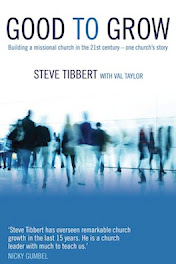One of my all time favourite leadership books is Bob Clinton’s The Making of a Leader. It is a leadership book which deserves more than one reading! Recently I called in to see my friend Simon Allen as he recovered from a knee operation. He had just begun to re-read this classic leadership book, and we shared our favourite quotes - this coincided with my plan to share my favourite quotes in this blog over the next few weeks. So I hope you enjoy the series and perhaps it will encourage you to read this book for the first time... or maybe pick it up again!
Upon successful completion of the ministry task, the leader is usually given a bigger task. (p 34)
Occasionally, you meet leaders who have great Vision, and are always talking about it, but this leadership principle earths vision in present reality. The best way to fulfil your potential in God is to be faithful in the small matters, serve well and complete the ministry task before you currently. Then in due time God will give you further opportunity... (1 Peter 5).
Charismatic Gifts in Church History
4 weeks ago






